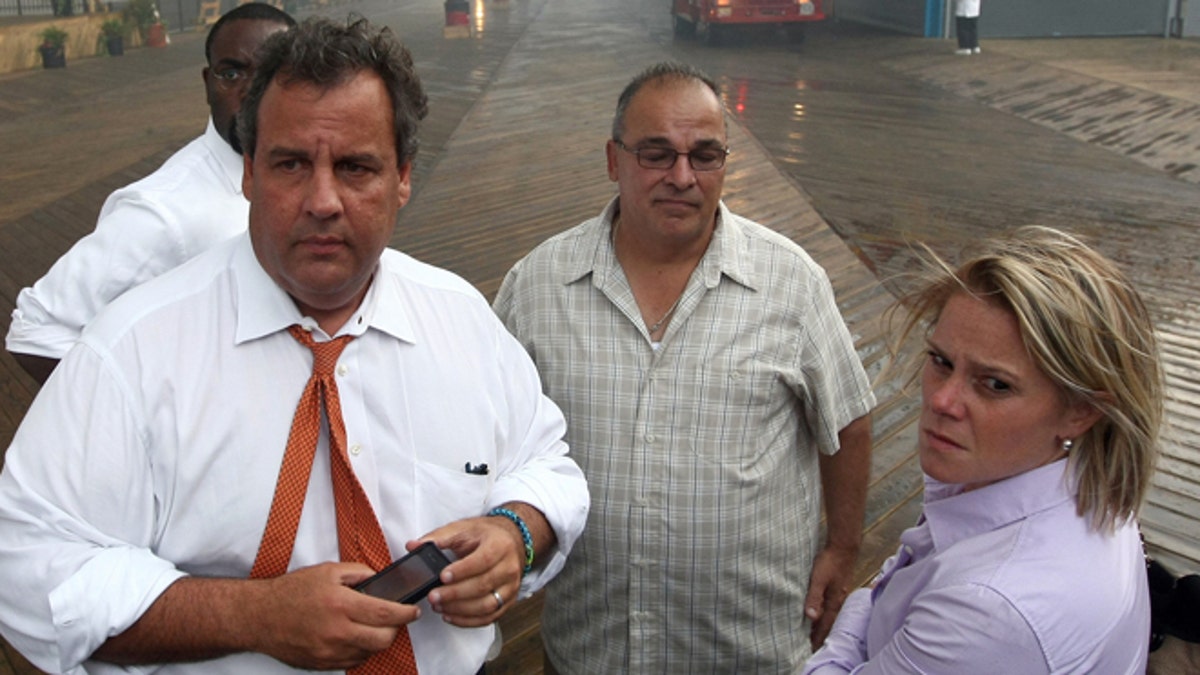
Sept. 12, 2013: Deputy Chief of Staff Bridget Anne Kelly, right, stands with Gov. Chris Christie, left, during a tour of the Seaside Heights, N.J. boardwalk after it was hit by a massive fire. (AP/Office of Chris Christie)
TRENTON, N.J. – Two former associates of Gov. Chris Christie do not have to hand over documents to a legislative committee investigating the traffic jam scandal engulfing the governor, a New Jersey judge ruled Wednesday.
Former Christie loyalists Bridget Kelly and Bill Stepien had been fighting subpoenas calling for them to turn over documents regarding the plot to create traffic jams in Fort Lee to retaliate against the town's Democratic mayor. The legislative panel asked for the court's help in getting the two to comply with the subpoenas.
Calling the decision one involving "complicated and untested jurisdictional issues," Judge Mary Jacobson expressed reservations about using judicial power to compel the production of documents.
"The fact that the committee has the power to enforce its own subpoenas through orders to compel and grant immunity in return, and the lack of a clear jurisdictional basis for this court to intrude upon that power, raises serious questions concerning the exercise of judicial power," Jacobson wrote in the 98-page opinion.
Her ruling is almost certain to be appealed.
The case has become a major distraction for Christie and is threatening to derail any plans to run for the Republican presidential nomination in 2016.
A report that exonerated him has done little to quell critics, because it was written by lawyers he hired and did not include interviews with key figures such as Kelly, Stepien and David Wildstein, the political operative who is believed to have dreamed up the scheme.
Lawyers for Kelly and Stepien asserted in briefs and court arguments in March the pair's Fifth Amendment right against self-incrimination due to an ongoing federal criminal investigation into the September traffic jams.
Lawyers for the legislative panel argued that the law does not entitle Kelly and Stepien to blanket protections from such subpoenas. They maintain that exceptions would have to be argued case-by-case.
Christie, 51, fired Kelly, who was a deputy chief of staff in the governor's office, and cut ties with Stepien, his former campaign manager, after learning in January that Kelly set the lane closings in motion with the message, "time for some traffic problems in Fort Lee."
Though no evidence has been made public that Stepien knew of the plot in advance, Christie said he lost confidence in his political adviser's judgment after reading emails in which he refers to Fort Lee's mayor as "an idiot" and appears to shrug off the traffic chaos the plot was causing.
Christie has said he had no knowledge of the planning or execution of the lane closings until well afterward.
Wildstein says he talked to Christie about the traffic jams on Sept. 11, the third day the lanes were blocked, but Christie says he doesn't recall the conversation. Stepien and others were forwarded an email from the mayor complaining about the gridlock on Sept. 12, the fourth and final full day the lanes approaching the George Washington Bridge were blocked. The executive director of the Port Authority of New York and New Jersey, the agency in charge of the bridge, ordered the approach lanes reopened the morning of Sept. 13.
Stepien has since found work with a Republican consulting firm based in Minnesota. Kelly, a single mother of four, is unemployed.
Their lawyers contend that the legislative panel could grant Kelly and Stepien immunity from prosecution in exchange for the documents. Reid Schar, the lead lawyer for the legislative panel, says the joint legislative body has no such powers.
Other people and organizations close to Christie, including his re-election campaign, are complying with legislative subpoenas. The first to do so was Wildstein, who turned over documents the committee requested but later invoked his Fifth Amendment right when called before the committee to testify.





















